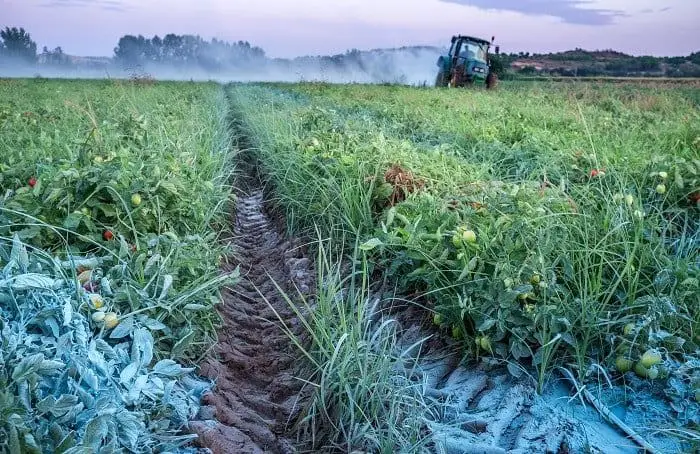Last Updated on December 29, 2022
Every organic farmer who wants to improve their soil pH and add natural nutrients ought to know where to buy sulfur powder and how to add it to the soil.
Sulfur powder is a natural pure element that comes in the form of a yellow powder. It is one of the world’s oldest remedies used for human ailments and for improving the soil for farming.
Where to Buy Sulfur Powder?
Most farmers wonder where to buy sulfur powder. It is common to find it in the most popular online markets by verified sellers. Amazon is some of the best stockists in the world like other online shops.
Where Does Sulfur Powder Come From?
It originates from volcanic emissions and ancient mined sulfur around volcanoes. Today, sulfur comes from a by-product of crude oil and gas processing. It is an essential element containing all living cells.
How to Add It to the Soil
This powder has many benefits to the soil and all farmers need to learn how to add it. Application for this powder depends on the type of soil you are working with. Below is a table showing how the sulfur powder should be distributed to lower the soil pH to 4.5.
|
Sulfur powder needs to lower the pH of the soil (lb/acre) |
|||
|
SOIL TYPE |
|||
| CURRENT pH | CLAY | LOAM | SAND |
| 5.0 | 175 | 530 | 800 |
| 5.5 | 350 | 1030 | 1600 |
| 6.0 | 530 | 1540 | 2300 |
| 6.5 | 660 | 2020 | 3030 |
| 7.0 | 840 | 2560 | 3800 |
Advantages of Adding Sulfur Powder to The Soil
This amazing powder has many health benefits for the soil. They include:
- Lowering the soil pH value. The best soil pH ranges from 5.8 to 7.0. Some soils especially in the limestone regions may have a high pH of about 8.0 with 50% lime. Such soils lack important minerals like iron, manganese, and zinc. In such soils, the leafy plants growing in them may become yellow due to deficiencies. Adding sulfur powder to the soil solves these problems.
- It is a great fungicide. This powder controls fungus and mildew on leaves. It is best known to prevent mold especially when applied before the fungus settles on the leaves. It works best when applied on dry leaves.
- It is best used as a pesticide. Sulfur powder is one of the oldest best-known pesticides. It is best used in vegetables and fruits. It controls thrips and spider mites. One has to wear a protective mask when applying this powder.
- It offers essential nutrients to plants. Sulfur carries essential plant nutrients that include, Potassium, Nitrogen, and Phosphorous. It also improves the soil and assists in fixing phosphorous and nitrogen.
- Used as a snake repellant – Snakes do not like the smell of sulfur powder. It is one of the best repellants for your outdoor surroundings without killing them.
- Used as an insect repellant on pets. Rubbing sulfur powder on pets eliminates chiggers, ticks, and other pests.
Learn more about organic fertilizers like Kelp Meal.
Where Do Plants Get Sulfur From?
Sulfur is an essential micronutrient for the growth and development of plants. It is mostly absorbed by plants in the form of sulfate from the soil. It is then translocated to plastids in the leaves, where it is then assimilated into organic products,
Sulfur plays an important role in plant photosynthesis, respiration as well as the formation of cell membrane structures. It originates from rocks and minerals that are released by weathering from water, temperature changes, and chemical reactions. When exposed to air, sulfur combines with oxygen to form sulfate which is the form that is available to plants.
Sulfur is stored in raw organic material and humus in most soils. Microorganisms in the soil work to decompose this organic matter and in the process, the organic sulfur is converted to sulfate, the form in which plants can absorb it.
Does Epsom Salt Add Sulfur to Soil?
Epsom salt is magnesium sulfate, meaning that it contains a form of sulfur in it.
It is important for plants as it helps their seeds germinate, makes the plants grow bushier, and produce more flowers. It can also help to improve chlorophyll production as well as deter insects and pests such as slugs and voles. Epsom salt may be a great addition to conventional fertilizer as it can supplement vital nutrients.
The best way to use Epsom salt is to drench the soil with a solution of 1 tablespoon of Epsom salt for 1 gallon of water. Apply this solution to the soil after seeding to help keep the sulfur levels in the soil up.
Another way of applying sulfur to the soil through Epsom salts is by sprinkling a cup of it on a seeded bed. This will greatly benefit your plants.
Epsom salts also have the added benefit of adding another nutrient to the soil, which is magnesium. This can give your plants a boost but it should only be used when there are deficiencies in the soil.
How Long Does it Take For Sulfur to Lower Soil pH?
One of the cheapest ways to lower the pH of the soil is to add sulfur. Bacteria in the soil transform sulfur into sulfuric acid which has the effect of lowering the soil pH.
The application rate needed to reduce by 2 points is about 2000 lb per square acre of area.
Using sulfur to lower soil pH is a slow process so large pH changes are unlikely to happen quickly. It may take up to years to see a noticeable change.
For a smaller area, a pH change may take about 2 to 3 months. Make sure you get the best quality Epsom salts to achieve this. Add sulfur this year to lower the pH for the following year or the next growing season. This will give the sulfur and bacteria in the soil enough time to react and produce their required results.
When Do You Apply Sulfur to Soil?
A spring application of sulfur usually works best. It is during this season that you will have the highest activity of bacteria that will transform sulfur to sulphuric acid, which will help lower the pH
Because this is such a slow process, you may have to repeat the application over the years to get the best results.
What Should Sulfur Levels Be in Soil?
The critical limit of sulfur in the soil is approximately 7-15 ppm. Anything below this range may hamper plant growth and production.
Take Away
It’s not common to find one powder that takes care of so many problems like this one. This one is beyond doubt!
FAQs
How do you add sulfur powder to soil?
Sulfur (S) is an important mineral that's often added to the soil. You can add it directly, or if you're working with a large volume of soil, you can add it as a liquid or powder and then mix in the soil.
You don't need to add sulfur to the soil, but you can use it as a fertilizer. It is sold as a dry powder for use in garden and flower beds, and you mix it with water and water-soluble fertilizers to create a water-soluble product. It will be available at your local garden center or nursery.
If you need to add sulfur to your soil, you need to find a source of elemental sulfur, or hydrogen sulfide.
Sulfur is applied to the soil as a component of a sulfur-based fertilization program. The amount of sulfur applied to soil is determined by the type of soil and climate you are growing in.
What is sulfur good for?
Sulfur is a key ingredient of soil. It helps plants to absorb nutrients, and it also improves soil structure. Sulfur is found in many different sources such as soil, compost, gypsum, wood ash, seaweed, sulphate of lime, sulphate of magnesia and gypsum.
Sulfur is an essential nutrient for plant growth and development. Plants require sulfate for the synthesis of many important compounds, such as amino acids, fatty acids, proteins, nucleic acids, chlorophyll, and vitamins.
Sulfur is a mineral that can be added to your garden. It will increase the number of healthy plants and decrease the number of sick plants.
If you are trying to boost your soil's fertility, adding sulfur to your soil is an important step. Sulfur is a key component of the process that converts atmospheric nitrogen into plant-available nitrogen.
Where can you buy powdered sulfur?
Powdered sulfur is sold in chemical supply stores. It's usually labeled "sulfur", "sulfate" or "S". The "powder" part of the label means it's fine, and not a coarse rock powder. I've seen it in a couple of different grades, but I'd suggest the cheapest one that still gets the job done.
You can use elemental sulfur (sulfuric acid) or sodium sulfate. These are sold in garden centers as "plant food", or as "plant food pellets" (I have not seen them for sale under any other name). They are very cheap and easy to use.
How much sulfur should I add to my soil?
Plants have different needs for sulfur, and you need to test the soil in your garden and add the proper amount. There are different ways to measure sulfur. The most common way is to use the sulfate of potash method. This involves mixing up a little water with the soil.
Sulfur is found in all soils but its availability is low because most plants cannot use it. Sulfur is also very mobile and can be carried out of the soil by water.

Lory is an avid gardener who loves spending time outdoors. She is passionate about using her green thumb to create beautiful, lush gardens for her friends and family. She finds joy in tending to her garden, trimming plants, and cultivating new species. She loves to share her knowledge and experience with others who have a similar enthusiasm for gardening. Lory is a true nature enthusiast who loves to share her enthusiasm for the outdoors with all who meet her.

